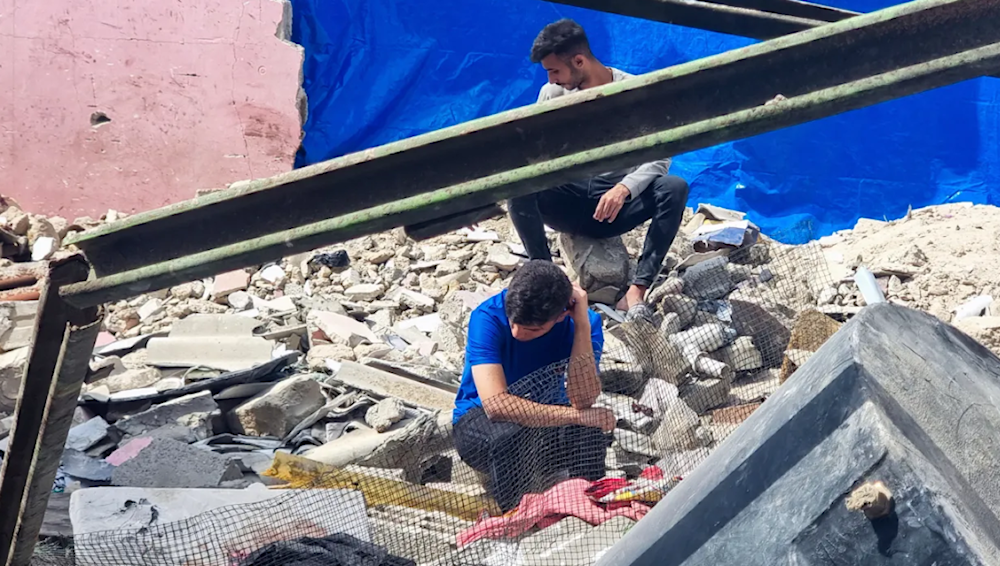NYT: Israeli plan for post-war Gaza, shared power with Arab states, US
Due to the lack of a ceasefire in Gaza and Benjamin Netanyahu's staunch opposition to establishing a Palestinian state, alongside an Israeli potential offensive on Rafah, Saudi Arabia is advocating for a scaled-down "plan B".
-

Palestinians look at the destruction after an Israeli airstrike in Rafah, Gaza Strip. Monday, April 29, 2024. (AP)
According to The New York Times, senior Israeli officials are allegedly discussing sharing administration of the land in the postwar Gaza Strip with a partnership of Arab countries and the United States.
The concept indicates that the Israeli-US alliance with Arab normalizing states will what was described as "Gazan leaders" to rebuild the infrastructure and "maintain calm," according to the publication.
According to the source, after 7 to 10 years, Gazans would be allegedly able to vote on whether to join the united Palestinian government, which is slated to oversee both the strip and the West Bank.
Arab rulers allegedly rejected the idea, seeing it as inadequate since it does not pave the path for a Palestinian state.
The idea is anticipated to be proposed by the Israeli occupation in exchange for normalizing relations with Saudi Arabia, which has been considered a potential alliance partner with Egypt and the United Arab Emirates, according to the newspaper. However, Saudi authorities fear the idea would be rejected by Arab countries since it does not guarantee the establishment of a Palestinian state, according to reports.
This comes as The Guardian reported that the US and Saudi Arabia have formulated a series of pacts regarding security and technology exchange, initially intended to be part of a larger Middle East resolution encompassing "Israel" and the Palestinians.
Due to the lack of a ceasefire in Gaza and Benjamin Netanyahu's staunch opposition to establishing a Palestinian state, alongside "Israel's" potential offensive on Rafah, Saudi Arabia is advocating for a scaled-down "plan B" that does not involve "Israel", the report added.
Under Riyadh's proposed "plan B", "Israel" would receive an offer of normalizing diplomatic relations with Saudi Arabia in exchange for accepting the "two-state solution". However, completing the US-Saudi agreements would not be contingent on approval from the Netanyahu government, as per the alternative proposal.
In March, Responsible Statecraft reported that some of the masterminds behind the US' invasion of Iraq were mulling a plan for reconstructing and "de-radicalizing" Gaza's remaining population and maintaining "Israel's freedom of action."
The Trust would also have the liberty to “hire private security contractors with good reputations among Western militaries,” which will collaborate with Israeli occupation forces (IOF).
Hamas stands firm rejecting external pressure, studying proposal
The Hamas representative in Lebanon, Ahmed Abdel Hadi, in an interview with Al Mayadeen, said that although the movement is "seriously studying" the proposals for a ceasefire agreement, it is "too early to judge the results," noting that the papers presented contain "general phrases that could suggest something ambiguous," and emphasizing the role of the negotiators in this part.
Abdel Hadi pointed out that the only sides discussing positive outcomes from reaching an agreement are the US and Israeli sides. He stressed that no one has succeeded in pressuring the Resistance to accept any deal and emphasized that "the popular support for the Resistance cannot raise the white flag."
Regarding the threat of an Israeli military operation in Rafah, in the southern Gaza Strip, Abdel Hadi said, "Netanyahu wants to prolong the war, and he agreed to a partial cessation of it. The threat to invade Rafah is to pressure the Resistance," he said, stressing that "many surprises will confront the Israeli Prime Minister if he decides to invade Rafah."
Al Mayadeen had acquired the details of the latest proposed deal between the Palestinian Resistance and the Israeli occupation, specifically related to the prisoner exchange deal and related clauses.
The framework of the agreement aims to achieve the release of all Israeli civilian and military captives, be they dead or alive, held in the Gaza Strip. The agreement will not only encompass captives taken on October 7 but all Israeli captives.
Primarily, the deal's objective is to achieve calm in the area and work on reaching a ceasefire, the document acquired by Al Mayadeen explains.

 4 Min Read
4 Min Read








